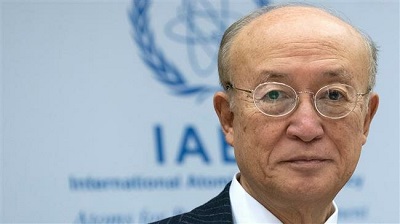The head of the International Atomic Energy Agency (IAEA) has reaffirmed Iran’s compliance with its nuclear-related commitments under the Joint Comprehensive Plan of Action (JCPOA).
“In my regular reports to the board I have stated that Iran is implementing those commitments,” IAEA Chief Yukiya Amano stressed on Tuesday.
“Since January 2016, the agency [IAEA] has been verifying and monitoring Iran’s implementation of its nuclear-related commitments under the JCPOA,” he added.
Amano further noted that IAEA inspectors have full access to all locations required to verify the deal’s implementation, Press TV reported.
Under the agreement, reached between Iran and the P5+1 group of countries in 2015, Tehran undertook to put limits on its nuclear program in exchange for the removal of nuclear-related sanctions.
United States President Donald Trump, however, withdrew Washington from the landmark agreement last May and decided to re-impose what it described as the “toughest” sanctions ever against Tehran. The sanctions targeted Iran’s banking and energy sectors with the aim of cutting off the country’s oil sales and crucial exports.
Amano’s remarks came as the US special representative for Iran says Washington is not looking to grant any further waivers to countries importing Iranian oil.
Brian Hook said three of the eight countries that had been granted exemptions have already cut their imports to zero. He did not specify the countries in question.
Hook stressed that oil market conditions are now prepared for the US to ramp up pressure on Iran’s oil sector.
Despite Washington’s measures, Iran has not left the deal, stressing that the remaining signatories to the agreement have to work to offset the negative impacts of the US pullout for Iran if they want Tehran to remain committed to it.
Consequently, remaining European signatories unveiled the Instrument in Support of Trade Exchanges (INSTEX) earlier this year after spending months discussing possible mechanisms to guarantee continued trade.
The Europeans, however, presented INSTEX with preconditions which require Iran to join the FATF (the Financial Action Task Force) and start negotiations on its missile program, prompting senior Iranian officials to object to the plan.
Furthermore, as Iran faces ongoing nationwide floods since March 19, Iranian Foreign Minister Mohammad Javad Zarif has said that US sanctions institute a case of “economic terrorism” that hampers relief efforts related to flood-stricken people across the country.
M.Wassouf

